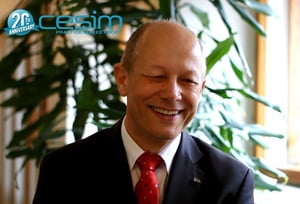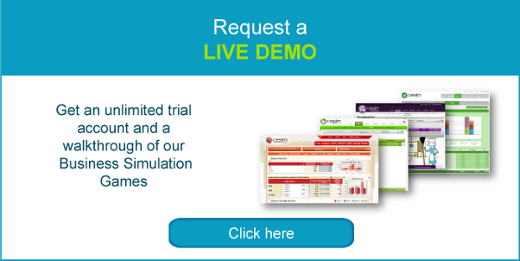 If you are a hotel and restaurant management educator looking for an engaging and hands-on approach to teach hospitality concepts, look no further.
If you are a hotel and restaurant management educator looking for an engaging and hands-on approach to teach hospitality concepts, look no further.
Cesim Hospitality simulation gives participants the opportunity to experience running hotel and restaurant operations in competition with other teams. They can try and practice with different scenarios as well as analyze the outcomes of their decisions and projections. For each round, the restaurant and hotel management game generates a range of detailed reports that help the teams to analyze and benchmark their performance against their competitors. Financial results are reported according to the Uniform System of Accounts for Restaurants and for the Lodging Industry.
The hospitality simulation game is modular which allows instructors to choose whether learners play with both lodging and food & beverage operations or play with only one of them. In addition, the system permits the instructors to modify and create their own personalized cases. The platform provides information about each participant’s and team’s activity and performance to the instructor.
We have collected a list of 6 typical hospitality management concepts that your students can practice with Cesim's restaurant and hotel management simulation game:
1. Revenue Management

Revenue management is a set of techniques and procedures that use hotel-specific data to influence occupancy, average daily rate, or both for the purpose of maximizing revenue.
In Cesim’s restaurant and hotel simulation game, the participants manage revenue by pricing differently for different advance purchase periods. The simulation includes last minute and walk-in rates for the current two-week period, a regular rate for two weeks in advance, and an early bird rate for a four weeks advance purchase. In addition, teams estimate sales for pre-agreed business rate customers.
Different teams also need to establish their firm’s strategic long-term price position relative to the competition since the hospitality simulation maintains price image for each of the hotels. Seasonal and special events influence the overall demand for all hotels and teams need to take those into account when they set prices.
2. Sales Promotion
Distribution strategy in the simulation is handled by the sales promotion function. It includes different communication activities and channels that can be used to stimulate immediate sales. Teams are responsible for determining which activities and channels to use and when.
Participants have six promotion options to choose from. Each of the options has a different kind of effect and the cost varies.
The options in the hospitality simulation are:
(1) Internet reservation discount
(2) Quota for major internet intermediary
(3) Additional promotions for business customers
(4) Additional promotion for leisure customers
(5) Opaque sales
(6) External promoter services
3. Menu Engineering
The goal with menu engineering is to maximize the restaurant’s profitability. In Cesim Hospitality, participants can exercise menu engineering through detailed menu engineering decisions. They first prepare a menu consisting of four dishes. For each dish the participants must decide the key ingredient and whether it is fresh, frozen or pre-processed, the serving style (stew, salad etc.), and preparation detail.
In addition, teams also decide the beverage selection. The more complex the beverage list participant teams choose to offer, the more attractive their bar will be for customers. A wider beverage list will also carry a higher fixed cost.
To facilitate the menu engineering process, participants have detailed cost calculation projections available for their restaurants. They can see the breakdown of costs for ingredients and for allocated preparation time. As a result, when considering pricing they are able to see their margins and margin percentages for each dish and for the restaurant as a whole.
Besides menu and dishes, participants also make table arrangement and staffing decisions for their restaurant.
4. Housekeeping
Housekeeping is the function that manages the hotel's cleaning staff, and keeps guest rooms tidy. Housekeeping can be handled with own staff and/or by outsourcing.
In the hospitality simulation housekeeping deals with cleaning up the rooms, public spaces and exterior of the hotel. The decisions made for housekeeping concern housekeeping quality, choosing priority areas, selecting the outsourcing firm used for replacing/supplementing one's own housekeeping staff, and housekeeping manager activities. Customer and also to some extent employee satisfaction are influenced by housekeeping quality.
5. Human Resources Management
Human resources strategy must be aligned with the overall strategy of the firm. In Cesim Hospitality, teams can utilize permanent staff, temporary staff, and flexible staff. Each of these has different costs and skill levels. Human resources decisions influence both employee and customer satisfaction.
Teams decide the staffing for each function separately by setting the target amount of permanent and temporary staff. Flexible staff will be utilized automatically in case the permanent and temporary are insufficient.
As part of the human resources decisions, teams decide staff compensation policy, key personnel compensation policy, temporary staff policy, and training policy.
Teams also decide the management duty for all functions separately. The front desk manager, restaurant manager, housekeeping manager, maintenance manager, and hotel manager each require a main priority for every round. There are five different priorities to choose from and each of these have different outcomes for the function’s operations.
6. Procurement
In Cesim hotel and restaurant simulation, the procurement function consists of handling purchases.
Participants plan how much of each item to purchase taking into the items in the stock and estimated demand for the period. Items include room consumables for the hotel, and beverages and dish ingredients for the restaurant. The restaurant menu can consist of items that require fresh ingredients and spoilage may occur in case demand fails to meet expectations. On the other hand, if purchases are not sufficient, automatic replenishment will take place at extra cost.
These are examples of some business concepts you can teach with Cesim Hospitality. In addition to the above, teams have the opportunity to practice strategy planning and implementation. They also get to familiarize themselves with industry specific financial ratios, like GOPPAR, ADR, RevPAR, and RevPOR to name a few.
Interview with Pascal Lamoussière
Click CC to enable the subtitles
Quote from the interview:
"As a teacher, you can always do bright explanations on the blackboard, but with simulation games like this, we find, it's so much better. Because it helps students to experience the link between all the topics that they learn during the classes. It's better than all the bright explanations we can make.
For hospitality, it's important for them to understand that, it’s a human resources industry. It’s usually 80% human problems, and 20% customer problems. With this, they can understand, when they play the simulation, it’s very complicated, it needs real precise skills in order to be efficient."



